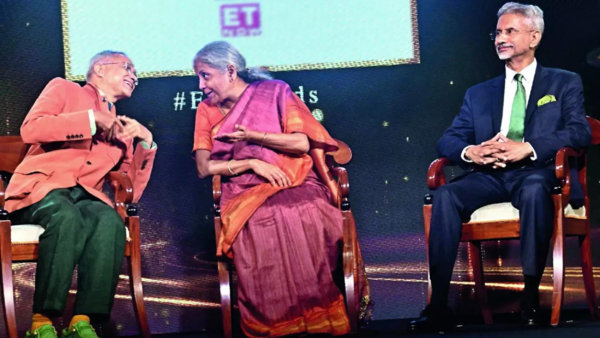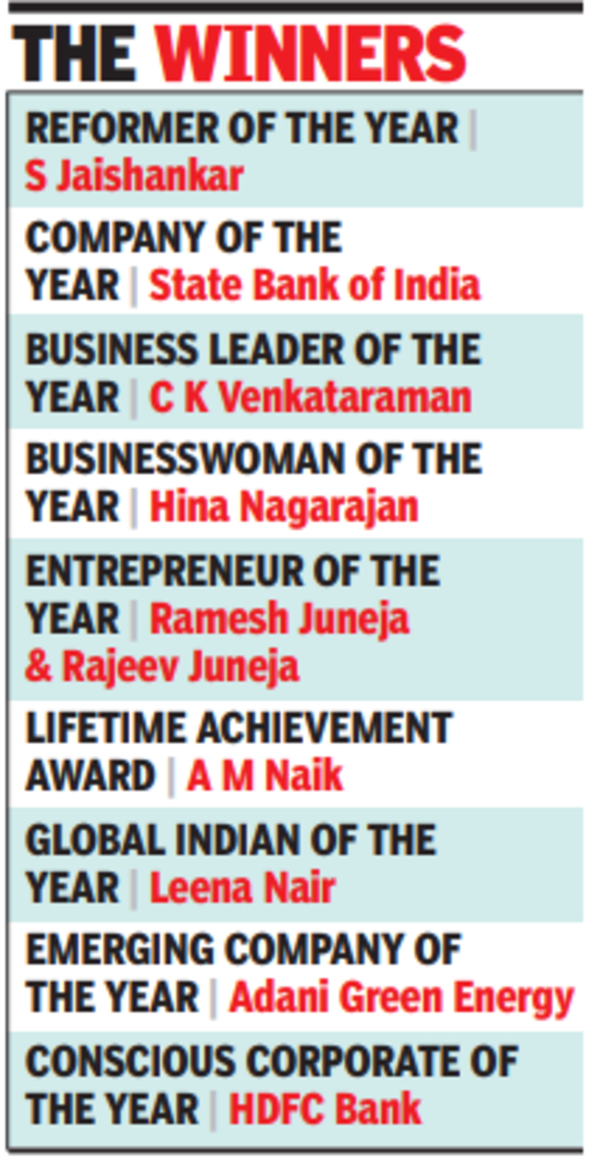Those were the key messages from speakers and panel discussions at The Economic Times Awards for Corporate Excellence, held in Mumbai on Friday.
FM Nirmala Sitharaman, addressing issues of employment and private investment, said: “When we look for data, we tend to look only at the formal sector… we don’t care about informal. (Also) we don’t look at new and emerging sectors, where huge changes are happening.” She spoke of semiconductors, renewable energy, storage capacities, railroads, and materials as sunrise sectors drawing new capital.

Samir Jain of The Times of India with finance minister Nirmala Sitharaman and external affairs minister S Jaishankar
S Jaishankar, external affairs minister and winner of ‘Reformer of the Year’ award, said foreign investors have started noticing India’s resilience amidst a general global slowdown. “Today, the world sees a country that’s able to seek its own solution, speak its mind and stand up, which it did when it came to energy choices,” he said.
Meera Jain, founder of Times Evoke, said CSR must “focus on all life”, not just humans. Jain pointed out that business often works under the illusion that “only human lives matter because only humans can create value”. But nature creates value in trillions, “ecosystems create $140 trillion in value each year” she said. If companies work to protect this, it’s “smart business”. She pointed to Anant Ambani’s Vantara initiative to rehabilitate rescued animals and Ratan Tata’s hospital for small animals as examples of a new, much-needed approach that values non-human lives.

To grow, India needs investment. Will there be enough of it, asked Ajay Piramal, chairman, Piramal Group. “For GDP to reach $10 trillion, the financial sector has to grow at least 18%. My concern is that there will not be enough capital. History shows that debt is what takes us forward,” he said. He argued that creating thriving NBFCs, which should be allowed to take deposits, and a long-term bond market were pivotal.
Satyan Gajwani, vice-chairman, Times Internet, spoke of India’s transformation in the 25 years since ET Awards were instituted in 1998. He pointed to big changes in public markets, retail investment and entrepreneurship. “Retail investors across all income levels are becoming savvier”, he said. Striking a positive note on AI, Gajwani said, “We are the civilisation that gave the world the concept of Maya. So, it should come as no surprise that we are taking to AI with such gusto”.
S N Subrahmanyan, chairman, Larsen & Toubro, speaking at a panel discussion, pointed to digital adoption, geopolitical changes, alternative fuels and sustainability goals as drivers of change. He also said private investment is picking up. “During Covid, our order book was nearly 95% govt. Today, it’s around 65% govt. Private orders are kicking in and this trend will increase,” he said
Rohit Jawa, CEO & MD, Hindustan Unilever, said “the India tech stack is a productivity (tool) that is going to last a long time”. He said out of HUL’s three million retailers, 1.3 million use the HUL app, which generates data, enabling them to get personal and business loans.
“When many developed economies are staring at a recession or a slowdown, India has shown resilience and emerged stronger,” said Romal Shetty, CEO of Deloitte South Asia. “India would remain the fastest-growing economy for the next few decades.”
A M Naik, Larsen & Toubro chairman emeritus, perhaps summed it all up for industry leaders in the audience. He said he could helm L&T for so long because “when you rush to work, you know you are going to enjoy it. You know you are leaving your enjoyment behind when you hesitate to leave work”.